Care Planning Processes: Assessment, Implementation, and Evaluation
VerifiedAdded on 2023/01/11
|22
|6429
|93
Report
AI Summary
This report delves into the multifaceted world of care planning processes within healthcare, encompassing a comprehensive analysis of assessment models, implementation strategies, and evaluation methodologies. The first part meticulously compares different assessment models and their implementation processes, emphasizing the importance of gathering subjective, holistic, and objective data to determine a patient's overall health and well-being. It also explores the application of theoretical perspectives on care planning, including humanistic and social learning theories, and reviews the legislative and regulatory frameworks supporting equality and diversity in care planning. The second part presents real-life case studies that demonstrate the practical application of care plans, highlighting their contribution to individual well-being. It examines the importance of person-centered care, reflecting on challenges and benefits encountered in the workplace. The report concludes with a reflective account, addressing the impact of care planning on individuals, carers, and healthcare practitioners.
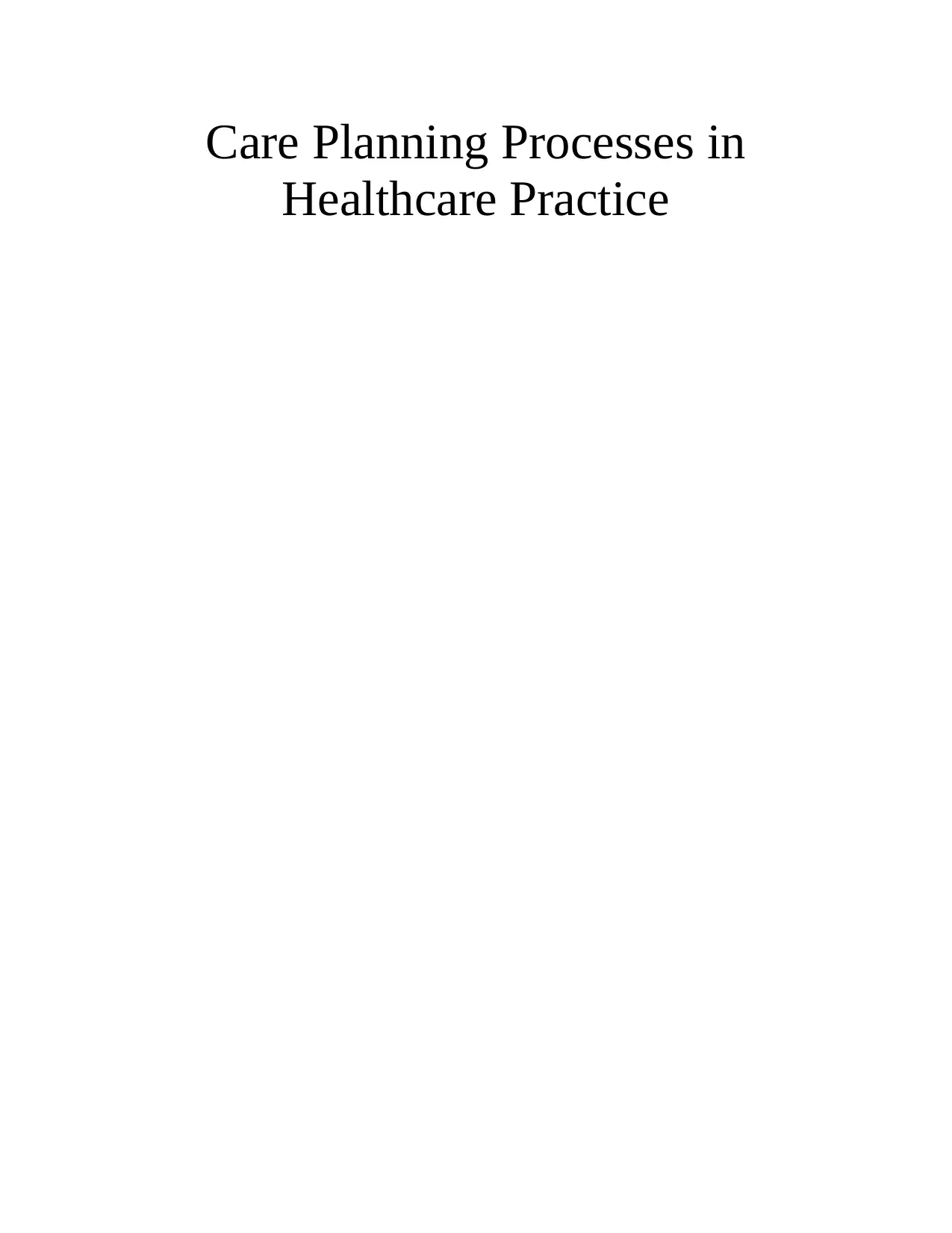
Care Planning Processes in
Healthcare Practice
Healthcare Practice
Paraphrase This Document
Need a fresh take? Get an instant paraphrase of this document with our AI Paraphraser
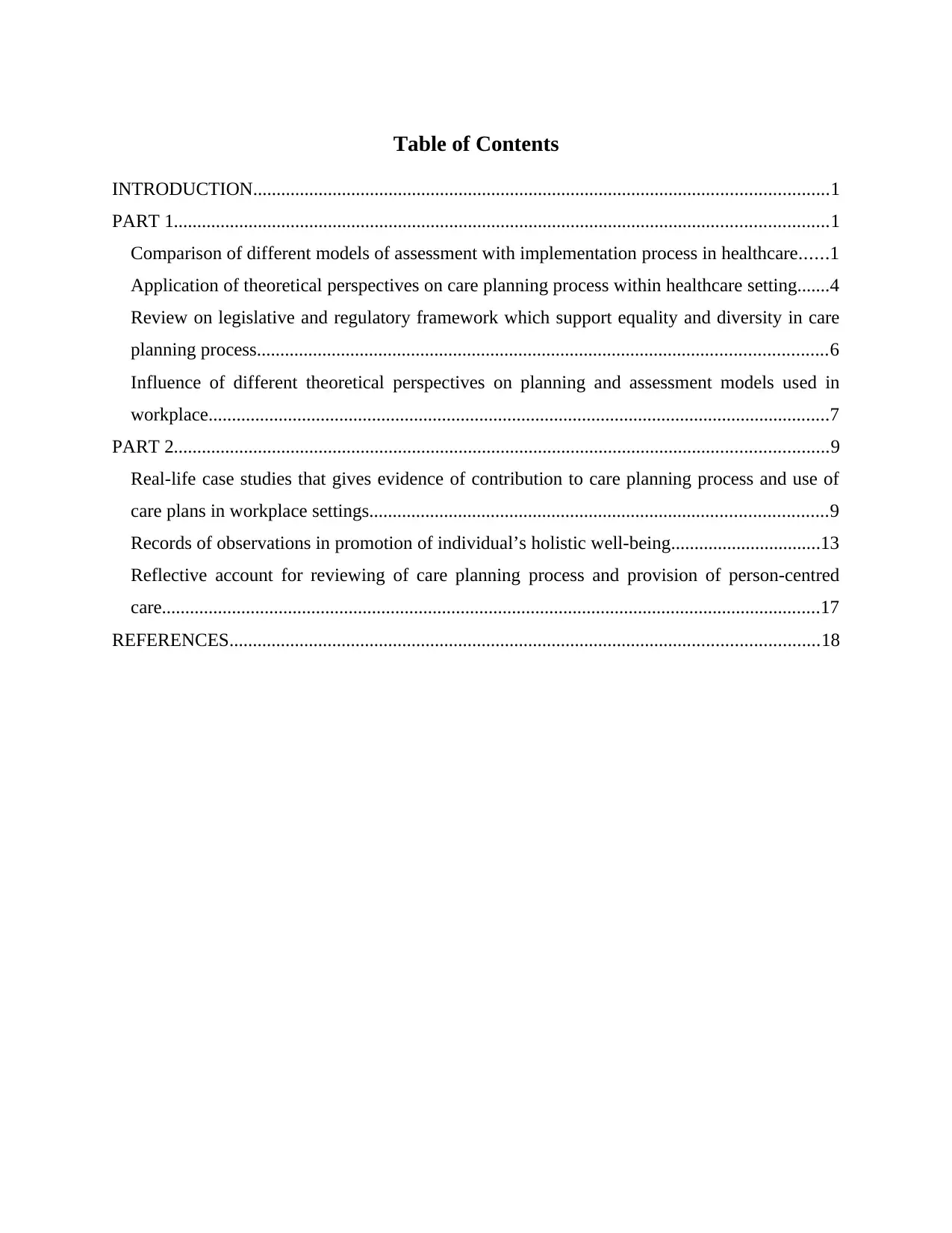
Table of Contents
INTRODUCTION...........................................................................................................................1
PART 1............................................................................................................................................1
Comparison of different models of assessment with implementation process in healthcare......1
Application of theoretical perspectives on care planning process within healthcare setting.......4
Review on legislative and regulatory framework which support equality and diversity in care
planning process..........................................................................................................................6
Influence of different theoretical perspectives on planning and assessment models used in
workplace.....................................................................................................................................7
PART 2............................................................................................................................................9
Real-life case studies that gives evidence of contribution to care planning process and use of
care plans in workplace settings..................................................................................................9
Records of observations in promotion of individual’s holistic well-being................................13
Reflective account for reviewing of care planning process and provision of person-centred
care.............................................................................................................................................17
REFERENCES..............................................................................................................................18
INTRODUCTION...........................................................................................................................1
PART 1............................................................................................................................................1
Comparison of different models of assessment with implementation process in healthcare......1
Application of theoretical perspectives on care planning process within healthcare setting.......4
Review on legislative and regulatory framework which support equality and diversity in care
planning process..........................................................................................................................6
Influence of different theoretical perspectives on planning and assessment models used in
workplace.....................................................................................................................................7
PART 2............................................................................................................................................9
Real-life case studies that gives evidence of contribution to care planning process and use of
care plans in workplace settings..................................................................................................9
Records of observations in promotion of individual’s holistic well-being................................13
Reflective account for reviewing of care planning process and provision of person-centred
care.............................................................................................................................................17
REFERENCES..............................................................................................................................18

⊘ This is a preview!⊘
Do you want full access?
Subscribe today to unlock all pages.

Trusted by 1+ million students worldwide
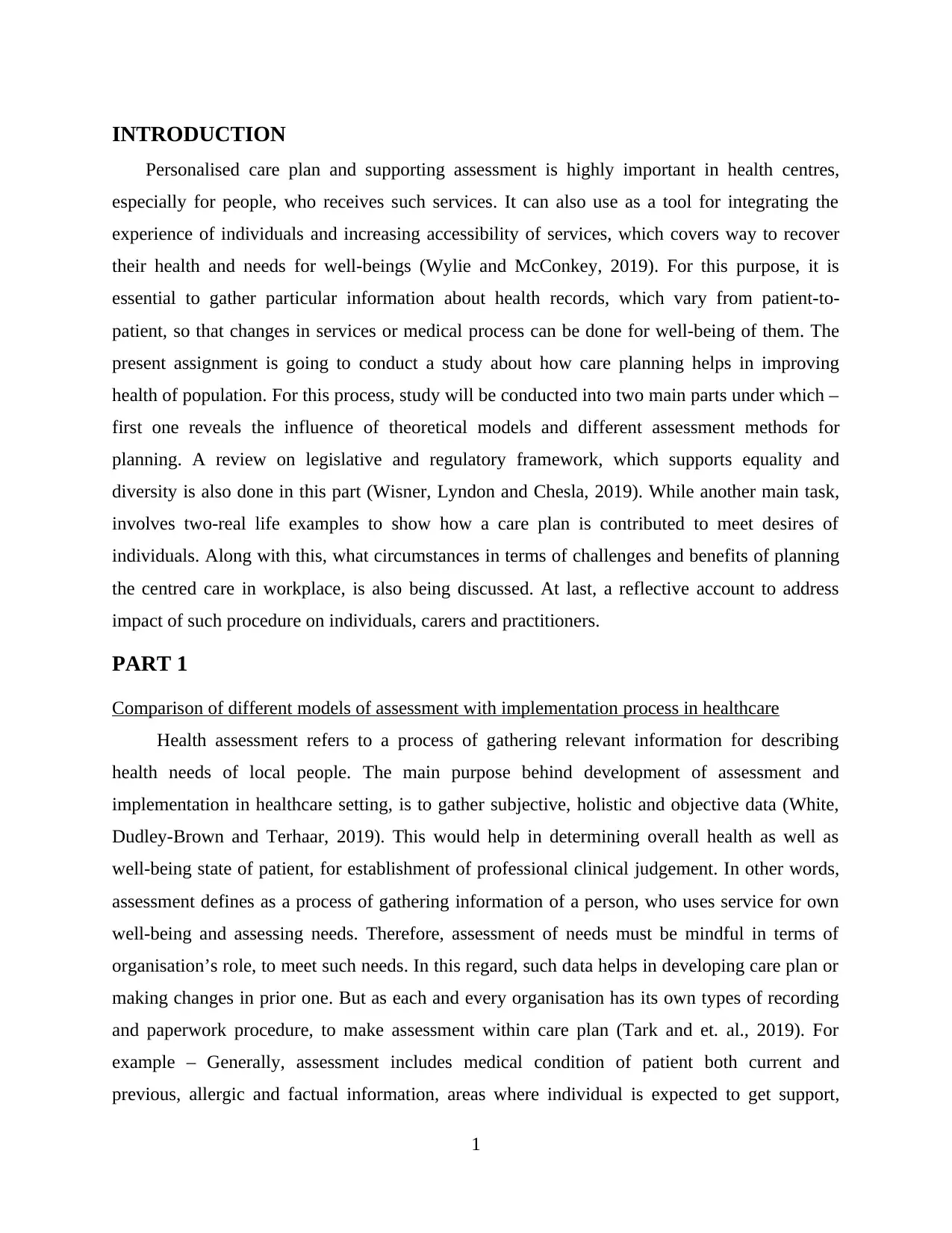
INTRODUCTION
Personalised care plan and supporting assessment is highly important in health centres,
especially for people, who receives such services. It can also use as a tool for integrating the
experience of individuals and increasing accessibility of services, which covers way to recover
their health and needs for well-beings (Wylie and McConkey, 2019). For this purpose, it is
essential to gather particular information about health records, which vary from patient-to-
patient, so that changes in services or medical process can be done for well-being of them. The
present assignment is going to conduct a study about how care planning helps in improving
health of population. For this process, study will be conducted into two main parts under which –
first one reveals the influence of theoretical models and different assessment methods for
planning. A review on legislative and regulatory framework, which supports equality and
diversity is also done in this part (Wisner, Lyndon and Chesla, 2019). While another main task,
involves two-real life examples to show how a care plan is contributed to meet desires of
individuals. Along with this, what circumstances in terms of challenges and benefits of planning
the centred care in workplace, is also being discussed. At last, a reflective account to address
impact of such procedure on individuals, carers and practitioners.
PART 1
Comparison of different models of assessment with implementation process in healthcare
Health assessment refers to a process of gathering relevant information for describing
health needs of local people. The main purpose behind development of assessment and
implementation in healthcare setting, is to gather subjective, holistic and objective data (White,
Dudley-Brown and Terhaar, 2019). This would help in determining overall health as well as
well-being state of patient, for establishment of professional clinical judgement. In other words,
assessment defines as a process of gathering information of a person, who uses service for own
well-being and assessing needs. Therefore, assessment of needs must be mindful in terms of
organisation’s role, to meet such needs. In this regard, such data helps in developing care plan or
making changes in prior one. But as each and every organisation has its own types of recording
and paperwork procedure, to make assessment within care plan (Tark and et. al., 2019). For
example – Generally, assessment includes medical condition of patient both current and
previous, allergic and factual information, areas where individual is expected to get support,
1
Personalised care plan and supporting assessment is highly important in health centres,
especially for people, who receives such services. It can also use as a tool for integrating the
experience of individuals and increasing accessibility of services, which covers way to recover
their health and needs for well-beings (Wylie and McConkey, 2019). For this purpose, it is
essential to gather particular information about health records, which vary from patient-to-
patient, so that changes in services or medical process can be done for well-being of them. The
present assignment is going to conduct a study about how care planning helps in improving
health of population. For this process, study will be conducted into two main parts under which –
first one reveals the influence of theoretical models and different assessment methods for
planning. A review on legislative and regulatory framework, which supports equality and
diversity is also done in this part (Wisner, Lyndon and Chesla, 2019). While another main task,
involves two-real life examples to show how a care plan is contributed to meet desires of
individuals. Along with this, what circumstances in terms of challenges and benefits of planning
the centred care in workplace, is also being discussed. At last, a reflective account to address
impact of such procedure on individuals, carers and practitioners.
PART 1
Comparison of different models of assessment with implementation process in healthcare
Health assessment refers to a process of gathering relevant information for describing
health needs of local people. The main purpose behind development of assessment and
implementation in healthcare setting, is to gather subjective, holistic and objective data (White,
Dudley-Brown and Terhaar, 2019). This would help in determining overall health as well as
well-being state of patient, for establishment of professional clinical judgement. In other words,
assessment defines as a process of gathering information of a person, who uses service for own
well-being and assessing needs. Therefore, assessment of needs must be mindful in terms of
organisation’s role, to meet such needs. In this regard, such data helps in developing care plan or
making changes in prior one. But as each and every organisation has its own types of recording
and paperwork procedure, to make assessment within care plan (Tark and et. al., 2019). For
example – Generally, assessment includes medical condition of patient both current and
previous, allergic and factual information, areas where individual is expected to get support,
1
Paraphrase This Document
Need a fresh take? Get an instant paraphrase of this document with our AI Paraphraser
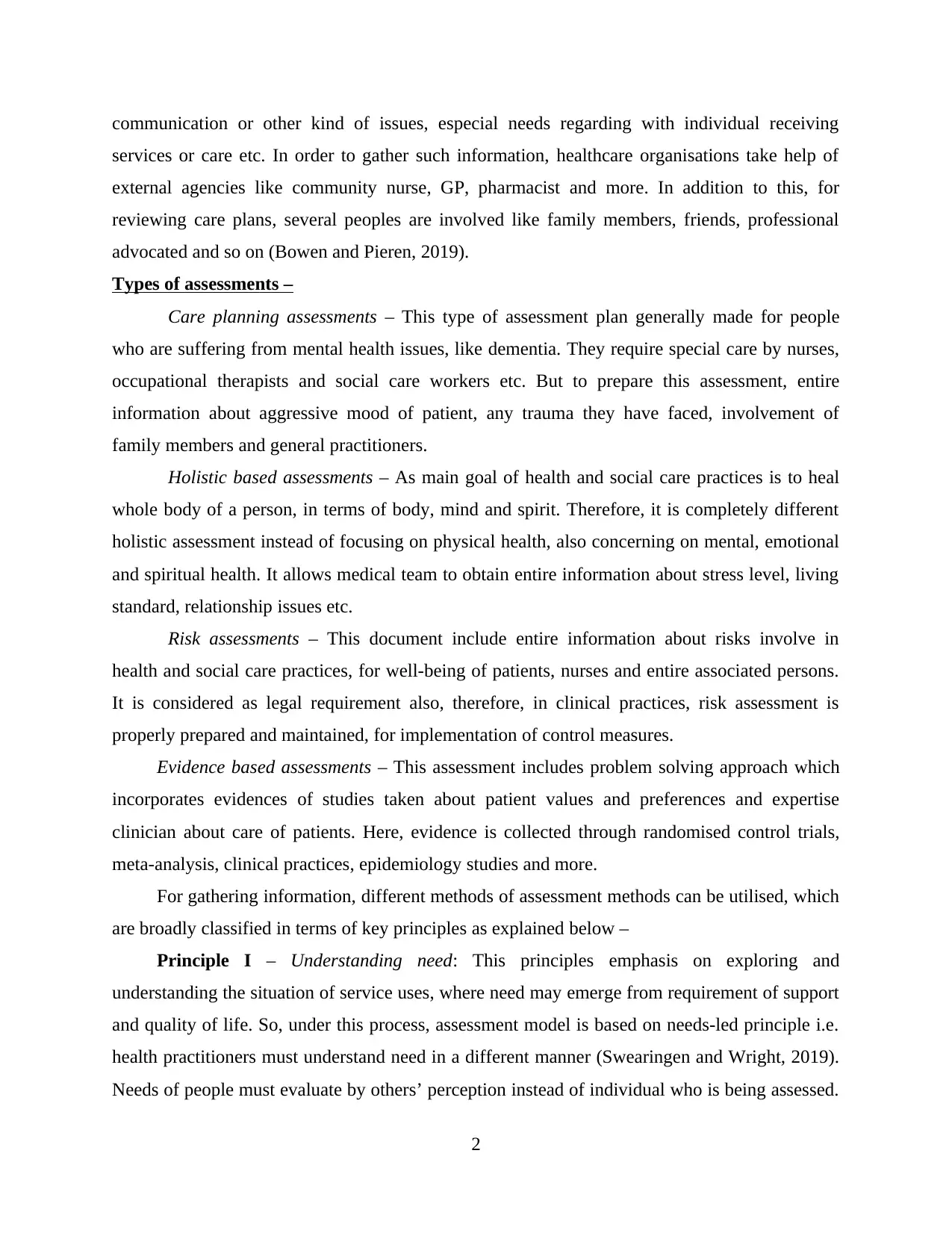
communication or other kind of issues, especial needs regarding with individual receiving
services or care etc. In order to gather such information, healthcare organisations take help of
external agencies like community nurse, GP, pharmacist and more. In addition to this, for
reviewing care plans, several peoples are involved like family members, friends, professional
advocated and so on (Bowen and Pieren, 2019).
Types of assessments –
Care planning assessments – This type of assessment plan generally made for people
who are suffering from mental health issues, like dementia. They require special care by nurses,
occupational therapists and social care workers etc. But to prepare this assessment, entire
information about aggressive mood of patient, any trauma they have faced, involvement of
family members and general practitioners.
Holistic based assessments – As main goal of health and social care practices is to heal
whole body of a person, in terms of body, mind and spirit. Therefore, it is completely different
holistic assessment instead of focusing on physical health, also concerning on mental, emotional
and spiritual health. It allows medical team to obtain entire information about stress level, living
standard, relationship issues etc.
Risk assessments – This document include entire information about risks involve in
health and social care practices, for well-being of patients, nurses and entire associated persons.
It is considered as legal requirement also, therefore, in clinical practices, risk assessment is
properly prepared and maintained, for implementation of control measures.
Evidence based assessments – This assessment includes problem solving approach which
incorporates evidences of studies taken about patient values and preferences and expertise
clinician about care of patients. Here, evidence is collected through randomised control trials,
meta-analysis, clinical practices, epidemiology studies and more.
For gathering information, different methods of assessment methods can be utilised, which
are broadly classified in terms of key principles as explained below –
Principle I – Understanding need: This principles emphasis on exploring and
understanding the situation of service uses, where need may emerge from requirement of support
and quality of life. So, under this process, assessment model is based on needs-led principle i.e.
health practitioners must understand need in a different manner (Swearingen and Wright, 2019).
Needs of people must evaluate by others’ perception instead of individual who is being assessed.
2
services or care etc. In order to gather such information, healthcare organisations take help of
external agencies like community nurse, GP, pharmacist and more. In addition to this, for
reviewing care plans, several peoples are involved like family members, friends, professional
advocated and so on (Bowen and Pieren, 2019).
Types of assessments –
Care planning assessments – This type of assessment plan generally made for people
who are suffering from mental health issues, like dementia. They require special care by nurses,
occupational therapists and social care workers etc. But to prepare this assessment, entire
information about aggressive mood of patient, any trauma they have faced, involvement of
family members and general practitioners.
Holistic based assessments – As main goal of health and social care practices is to heal
whole body of a person, in terms of body, mind and spirit. Therefore, it is completely different
holistic assessment instead of focusing on physical health, also concerning on mental, emotional
and spiritual health. It allows medical team to obtain entire information about stress level, living
standard, relationship issues etc.
Risk assessments – This document include entire information about risks involve in
health and social care practices, for well-being of patients, nurses and entire associated persons.
It is considered as legal requirement also, therefore, in clinical practices, risk assessment is
properly prepared and maintained, for implementation of control measures.
Evidence based assessments – This assessment includes problem solving approach which
incorporates evidences of studies taken about patient values and preferences and expertise
clinician about care of patients. Here, evidence is collected through randomised control trials,
meta-analysis, clinical practices, epidemiology studies and more.
For gathering information, different methods of assessment methods can be utilised, which
are broadly classified in terms of key principles as explained below –
Principle I – Understanding need: This principles emphasis on exploring and
understanding the situation of service uses, where need may emerge from requirement of support
and quality of life. So, under this process, assessment model is based on needs-led principle i.e.
health practitioners must understand need in a different manner (Swearingen and Wright, 2019).
Needs of people must evaluate by others’ perception instead of individual who is being assessed.
2
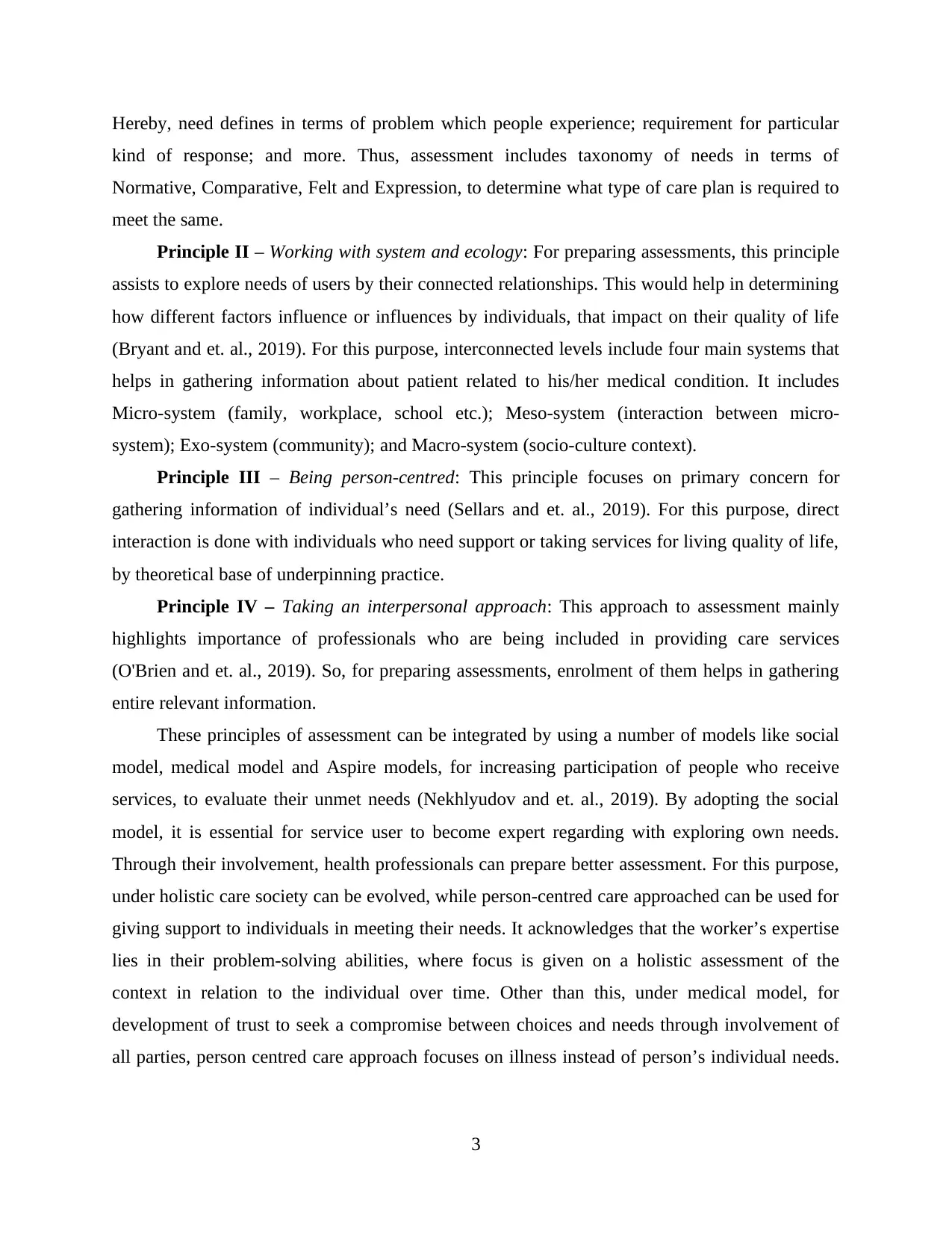
Hereby, need defines in terms of problem which people experience; requirement for particular
kind of response; and more. Thus, assessment includes taxonomy of needs in terms of
Normative, Comparative, Felt and Expression, to determine what type of care plan is required to
meet the same.
Principle II – Working with system and ecology: For preparing assessments, this principle
assists to explore needs of users by their connected relationships. This would help in determining
how different factors influence or influences by individuals, that impact on their quality of life
(Bryant and et. al., 2019). For this purpose, interconnected levels include four main systems that
helps in gathering information about patient related to his/her medical condition. It includes
Micro-system (family, workplace, school etc.); Meso-system (interaction between micro-
system); Exo-system (community); and Macro-system (socio-culture context).
Principle III – Being person-centred: This principle focuses on primary concern for
gathering information of individual’s need (Sellars and et. al., 2019). For this purpose, direct
interaction is done with individuals who need support or taking services for living quality of life,
by theoretical base of underpinning practice.
Principle IV – Taking an interpersonal approach: This approach to assessment mainly
highlights importance of professionals who are being included in providing care services
(O'Brien and et. al., 2019). So, for preparing assessments, enrolment of them helps in gathering
entire relevant information.
These principles of assessment can be integrated by using a number of models like social
model, medical model and Aspire models, for increasing participation of people who receive
services, to evaluate their unmet needs (Nekhlyudov and et. al., 2019). By adopting the social
model, it is essential for service user to become expert regarding with exploring own needs.
Through their involvement, health professionals can prepare better assessment. For this purpose,
under holistic care society can be evolved, while person-centred care approached can be used for
giving support to individuals in meeting their needs. It acknowledges that the worker’s expertise
lies in their problem-solving abilities, where focus is given on a holistic assessment of the
context in relation to the individual over time. Other than this, under medical model, for
development of trust to seek a compromise between choices and needs through involvement of
all parties, person centred care approach focuses on illness instead of person’s individual needs.
3
kind of response; and more. Thus, assessment includes taxonomy of needs in terms of
Normative, Comparative, Felt and Expression, to determine what type of care plan is required to
meet the same.
Principle II – Working with system and ecology: For preparing assessments, this principle
assists to explore needs of users by their connected relationships. This would help in determining
how different factors influence or influences by individuals, that impact on their quality of life
(Bryant and et. al., 2019). For this purpose, interconnected levels include four main systems that
helps in gathering information about patient related to his/her medical condition. It includes
Micro-system (family, workplace, school etc.); Meso-system (interaction between micro-
system); Exo-system (community); and Macro-system (socio-culture context).
Principle III – Being person-centred: This principle focuses on primary concern for
gathering information of individual’s need (Sellars and et. al., 2019). For this purpose, direct
interaction is done with individuals who need support or taking services for living quality of life,
by theoretical base of underpinning practice.
Principle IV – Taking an interpersonal approach: This approach to assessment mainly
highlights importance of professionals who are being included in providing care services
(O'Brien and et. al., 2019). So, for preparing assessments, enrolment of them helps in gathering
entire relevant information.
These principles of assessment can be integrated by using a number of models like social
model, medical model and Aspire models, for increasing participation of people who receive
services, to evaluate their unmet needs (Nekhlyudov and et. al., 2019). By adopting the social
model, it is essential for service user to become expert regarding with exploring own needs.
Through their involvement, health professionals can prepare better assessment. For this purpose,
under holistic care society can be evolved, while person-centred care approached can be used for
giving support to individuals in meeting their needs. It acknowledges that the worker’s expertise
lies in their problem-solving abilities, where focus is given on a holistic assessment of the
context in relation to the individual over time. Other than this, under medical model, for
development of trust to seek a compromise between choices and needs through involvement of
all parties, person centred care approach focuses on illness instead of person’s individual needs.
3
⊘ This is a preview!⊘
Do you want full access?
Subscribe today to unlock all pages.

Trusted by 1+ million students worldwide
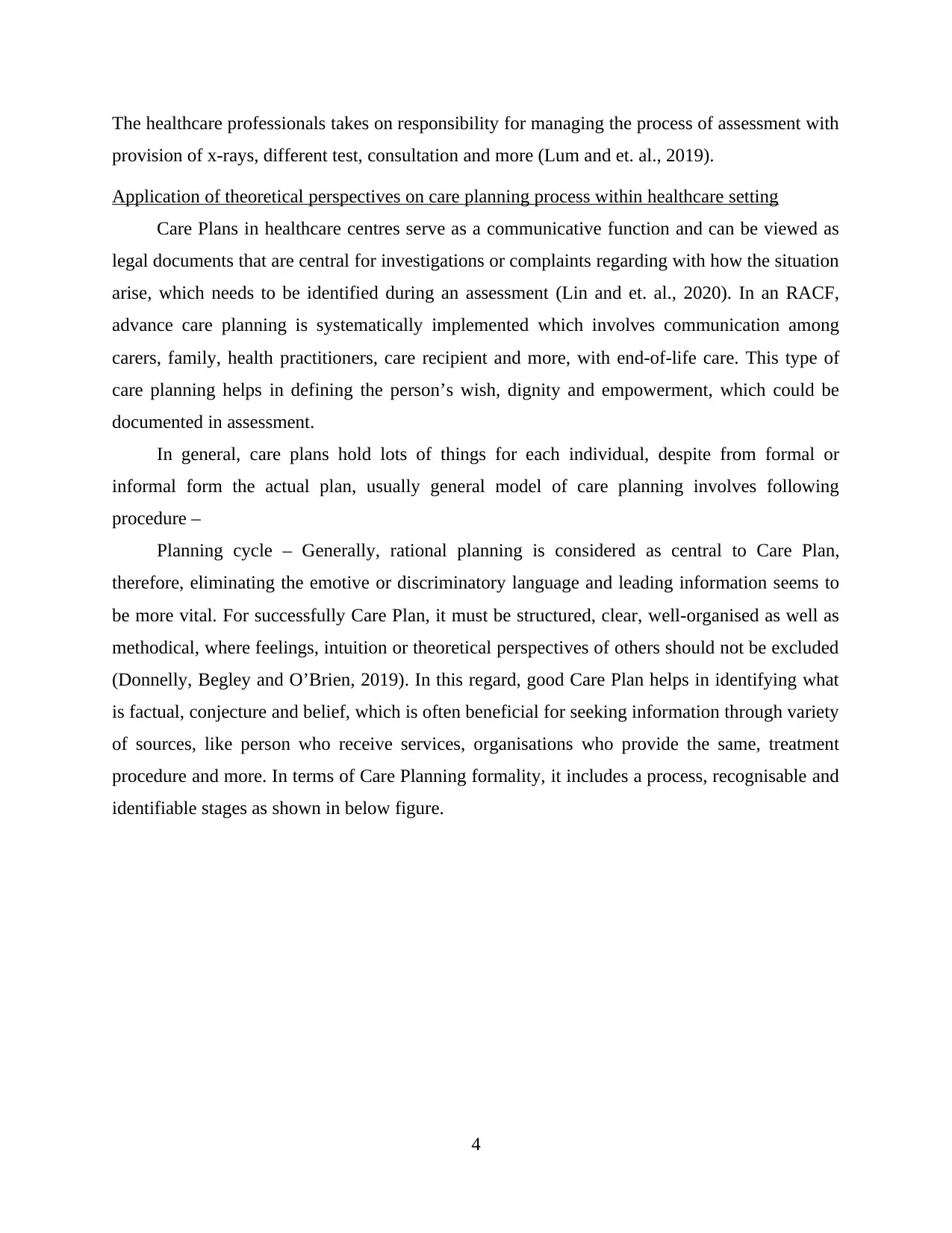
The healthcare professionals takes on responsibility for managing the process of assessment with
provision of x-rays, different test, consultation and more (Lum and et. al., 2019).
Application of theoretical perspectives on care planning process within healthcare setting
Care Plans in healthcare centres serve as a communicative function and can be viewed as
legal documents that are central for investigations or complaints regarding with how the situation
arise, which needs to be identified during an assessment (Lin and et. al., 2020). In an RACF,
advance care planning is systematically implemented which involves communication among
carers, family, health practitioners, care recipient and more, with end-of-life care. This type of
care planning helps in defining the person’s wish, dignity and empowerment, which could be
documented in assessment.
In general, care plans hold lots of things for each individual, despite from formal or
informal form the actual plan, usually general model of care planning involves following
procedure –
Planning cycle – Generally, rational planning is considered as central to Care Plan,
therefore, eliminating the emotive or discriminatory language and leading information seems to
be more vital. For successfully Care Plan, it must be structured, clear, well-organised as well as
methodical, where feelings, intuition or theoretical perspectives of others should not be excluded
(Donnelly, Begley and O’Brien, 2019). In this regard, good Care Plan helps in identifying what
is factual, conjecture and belief, which is often beneficial for seeking information through variety
of sources, like person who receive services, organisations who provide the same, treatment
procedure and more. In terms of Care Planning formality, it includes a process, recognisable and
identifiable stages as shown in below figure.
4
provision of x-rays, different test, consultation and more (Lum and et. al., 2019).
Application of theoretical perspectives on care planning process within healthcare setting
Care Plans in healthcare centres serve as a communicative function and can be viewed as
legal documents that are central for investigations or complaints regarding with how the situation
arise, which needs to be identified during an assessment (Lin and et. al., 2020). In an RACF,
advance care planning is systematically implemented which involves communication among
carers, family, health practitioners, care recipient and more, with end-of-life care. This type of
care planning helps in defining the person’s wish, dignity and empowerment, which could be
documented in assessment.
In general, care plans hold lots of things for each individual, despite from formal or
informal form the actual plan, usually general model of care planning involves following
procedure –
Planning cycle – Generally, rational planning is considered as central to Care Plan,
therefore, eliminating the emotive or discriminatory language and leading information seems to
be more vital. For successfully Care Plan, it must be structured, clear, well-organised as well as
methodical, where feelings, intuition or theoretical perspectives of others should not be excluded
(Donnelly, Begley and O’Brien, 2019). In this regard, good Care Plan helps in identifying what
is factual, conjecture and belief, which is often beneficial for seeking information through variety
of sources, like person who receive services, organisations who provide the same, treatment
procedure and more. In terms of Care Planning formality, it includes a process, recognisable and
identifiable stages as shown in below figure.
4
Paraphrase This Document
Need a fresh take? Get an instant paraphrase of this document with our AI Paraphraser
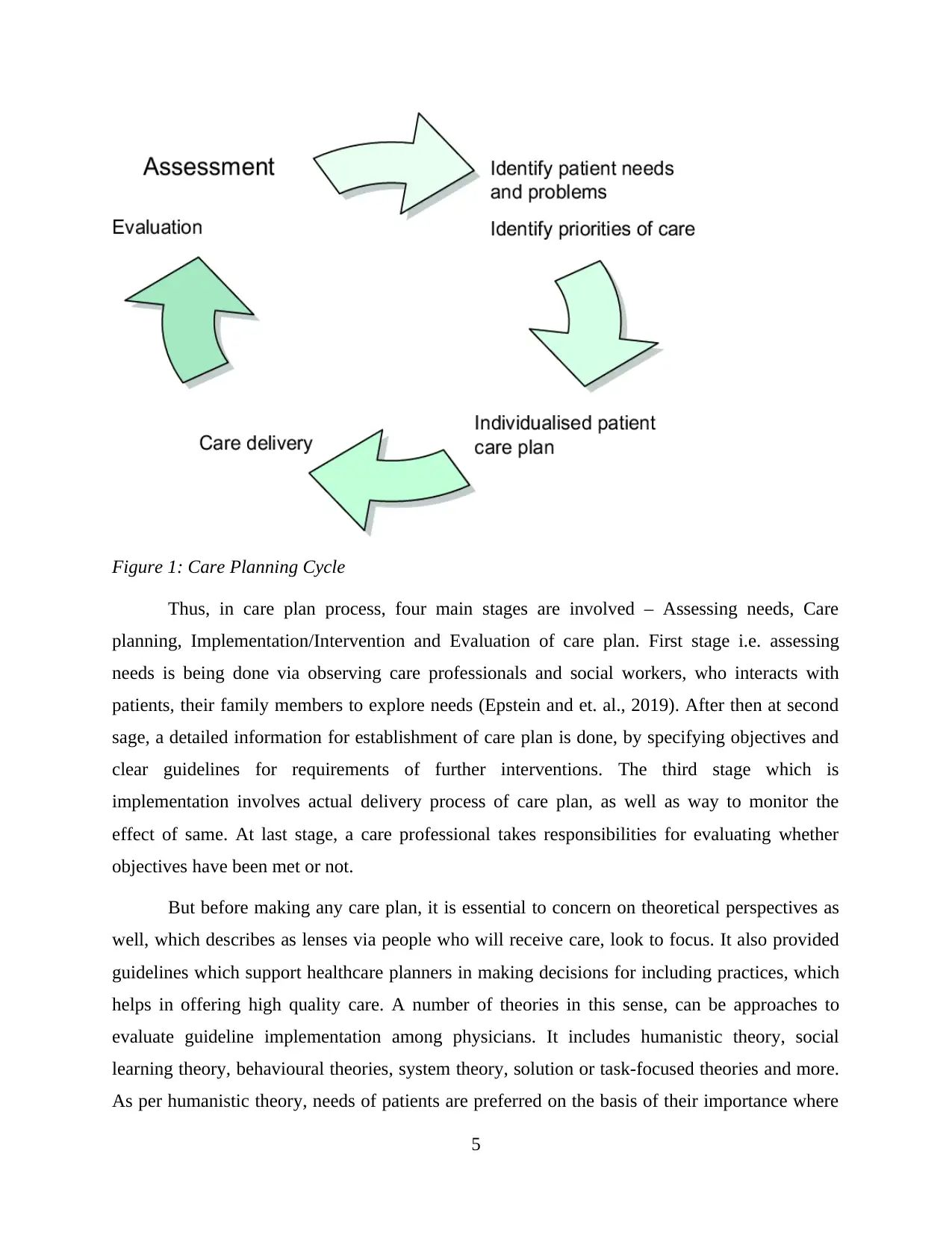
Figure 1: Care Planning Cycle
Thus, in care plan process, four main stages are involved – Assessing needs, Care
planning, Implementation/Intervention and Evaluation of care plan. First stage i.e. assessing
needs is being done via observing care professionals and social workers, who interacts with
patients, their family members to explore needs (Epstein and et. al., 2019). After then at second
sage, a detailed information for establishment of care plan is done, by specifying objectives and
clear guidelines for requirements of further interventions. The third stage which is
implementation involves actual delivery process of care plan, as well as way to monitor the
effect of same. At last stage, a care professional takes responsibilities for evaluating whether
objectives have been met or not.
But before making any care plan, it is essential to concern on theoretical perspectives as
well, which describes as lenses via people who will receive care, look to focus. It also provided
guidelines which support healthcare planners in making decisions for including practices, which
helps in offering high quality care. A number of theories in this sense, can be approaches to
evaluate guideline implementation among physicians. It includes humanistic theory, social
learning theory, behavioural theories, system theory, solution or task-focused theories and more.
As per humanistic theory, needs of patients are preferred on the basis of their importance where
5
Thus, in care plan process, four main stages are involved – Assessing needs, Care
planning, Implementation/Intervention and Evaluation of care plan. First stage i.e. assessing
needs is being done via observing care professionals and social workers, who interacts with
patients, their family members to explore needs (Epstein and et. al., 2019). After then at second
sage, a detailed information for establishment of care plan is done, by specifying objectives and
clear guidelines for requirements of further interventions. The third stage which is
implementation involves actual delivery process of care plan, as well as way to monitor the
effect of same. At last stage, a care professional takes responsibilities for evaluating whether
objectives have been met or not.
But before making any care plan, it is essential to concern on theoretical perspectives as
well, which describes as lenses via people who will receive care, look to focus. It also provided
guidelines which support healthcare planners in making decisions for including practices, which
helps in offering high quality care. A number of theories in this sense, can be approaches to
evaluate guideline implementation among physicians. It includes humanistic theory, social
learning theory, behavioural theories, system theory, solution or task-focused theories and more.
As per humanistic theory, needs of patients are preferred on the basis of their importance where
5
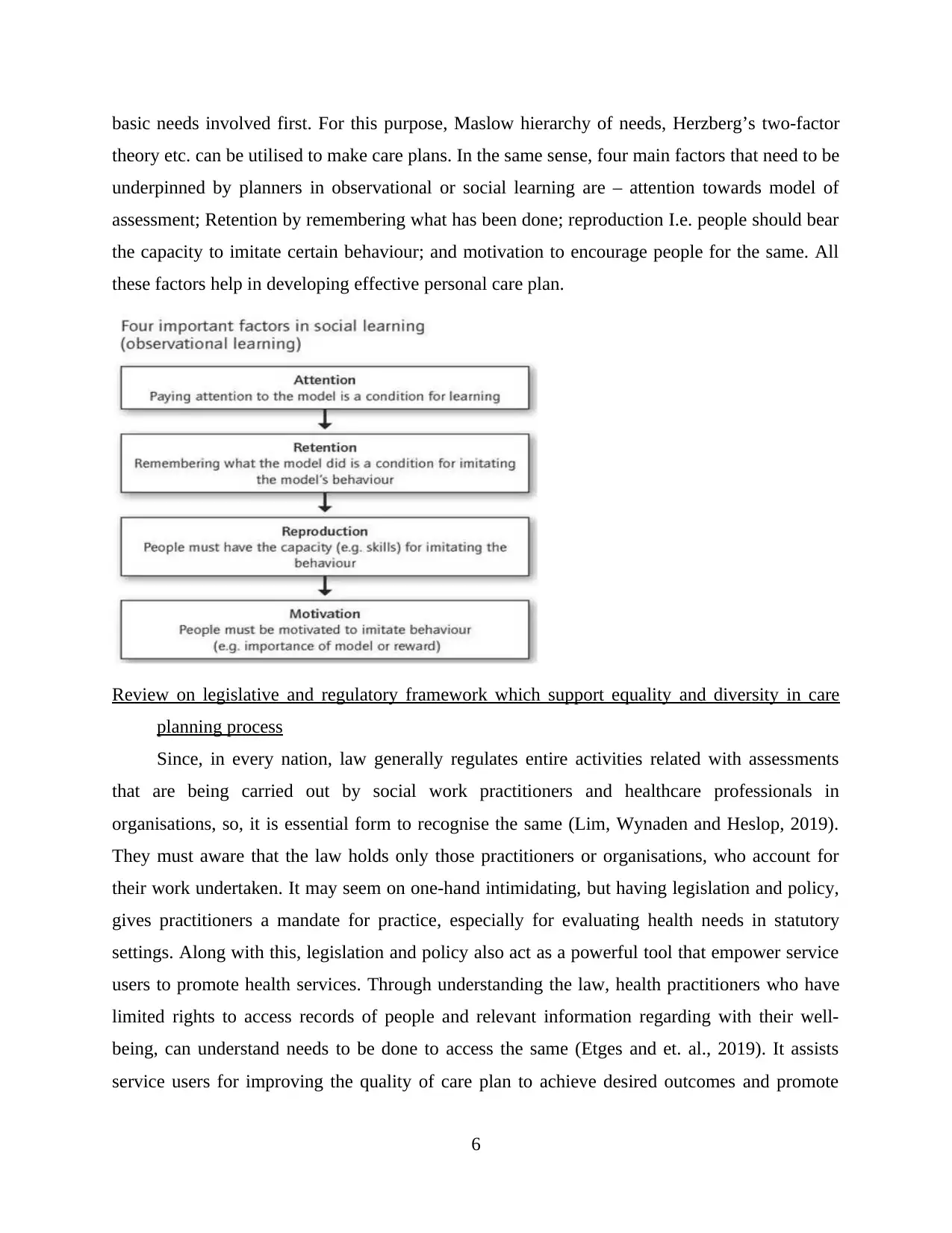
basic needs involved first. For this purpose, Maslow hierarchy of needs, Herzberg’s two-factor
theory etc. can be utilised to make care plans. In the same sense, four main factors that need to be
underpinned by planners in observational or social learning are – attention towards model of
assessment; Retention by remembering what has been done; reproduction I.e. people should bear
the capacity to imitate certain behaviour; and motivation to encourage people for the same. All
these factors help in developing effective personal care plan.
Review on legislative and regulatory framework which support equality and diversity in care
planning process
Since, in every nation, law generally regulates entire activities related with assessments
that are being carried out by social work practitioners and healthcare professionals in
organisations, so, it is essential form to recognise the same (Lim, Wynaden and Heslop, 2019).
They must aware that the law holds only those practitioners or organisations, who account for
their work undertaken. It may seem on one-hand intimidating, but having legislation and policy,
gives practitioners a mandate for practice, especially for evaluating health needs in statutory
settings. Along with this, legislation and policy also act as a powerful tool that empower service
users to promote health services. Through understanding the law, health practitioners who have
limited rights to access records of people and relevant information regarding with their well-
being, can understand needs to be done to access the same (Etges and et. al., 2019). It assists
service users for improving the quality of care plan to achieve desired outcomes and promote
6
theory etc. can be utilised to make care plans. In the same sense, four main factors that need to be
underpinned by planners in observational or social learning are – attention towards model of
assessment; Retention by remembering what has been done; reproduction I.e. people should bear
the capacity to imitate certain behaviour; and motivation to encourage people for the same. All
these factors help in developing effective personal care plan.
Review on legislative and regulatory framework which support equality and diversity in care
planning process
Since, in every nation, law generally regulates entire activities related with assessments
that are being carried out by social work practitioners and healthcare professionals in
organisations, so, it is essential form to recognise the same (Lim, Wynaden and Heslop, 2019).
They must aware that the law holds only those practitioners or organisations, who account for
their work undertaken. It may seem on one-hand intimidating, but having legislation and policy,
gives practitioners a mandate for practice, especially for evaluating health needs in statutory
settings. Along with this, legislation and policy also act as a powerful tool that empower service
users to promote health services. Through understanding the law, health practitioners who have
limited rights to access records of people and relevant information regarding with their well-
being, can understand needs to be done to access the same (Etges and et. al., 2019). It assists
service users for improving the quality of care plan to achieve desired outcomes and promote
6
⊘ This is a preview!⊘
Do you want full access?
Subscribe today to unlock all pages.

Trusted by 1+ million students worldwide
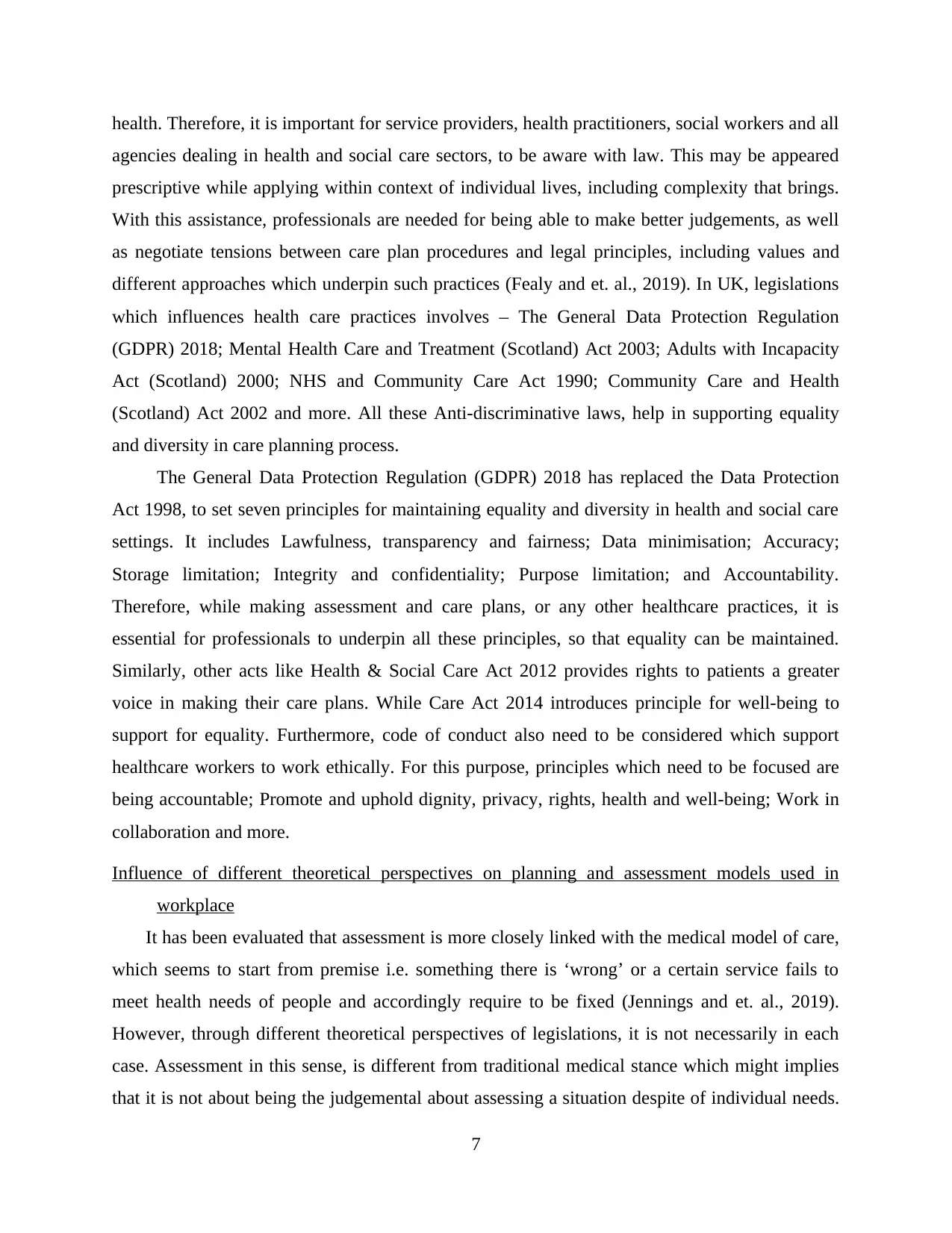
health. Therefore, it is important for service providers, health practitioners, social workers and all
agencies dealing in health and social care sectors, to be aware with law. This may be appeared
prescriptive while applying within context of individual lives, including complexity that brings.
With this assistance, professionals are needed for being able to make better judgements, as well
as negotiate tensions between care plan procedures and legal principles, including values and
different approaches which underpin such practices (Fealy and et. al., 2019). In UK, legislations
which influences health care practices involves – The General Data Protection Regulation
(GDPR) 2018; Mental Health Care and Treatment (Scotland) Act 2003; Adults with Incapacity
Act (Scotland) 2000; NHS and Community Care Act 1990; Community Care and Health
(Scotland) Act 2002 and more. All these Anti-discriminative laws, help in supporting equality
and diversity in care planning process.
The General Data Protection Regulation (GDPR) 2018 has replaced the Data Protection
Act 1998, to set seven principles for maintaining equality and diversity in health and social care
settings. It includes Lawfulness, transparency and fairness; Data minimisation; Accuracy;
Storage limitation; Integrity and confidentiality; Purpose limitation; and Accountability.
Therefore, while making assessment and care plans, or any other healthcare practices, it is
essential for professionals to underpin all these principles, so that equality can be maintained.
Similarly, other acts like Health & Social Care Act 2012 provides rights to patients a greater
voice in making their care plans. While Care Act 2014 introduces principle for well-being to
support for equality. Furthermore, code of conduct also need to be considered which support
healthcare workers to work ethically. For this purpose, principles which need to be focused are
being accountable; Promote and uphold dignity, privacy, rights, health and well-being; Work in
collaboration and more.
Influence of different theoretical perspectives on planning and assessment models used in
workplace
It has been evaluated that assessment is more closely linked with the medical model of care,
which seems to start from premise i.e. something there is ‘wrong’ or a certain service fails to
meet health needs of people and accordingly require to be fixed (Jennings and et. al., 2019).
However, through different theoretical perspectives of legislations, it is not necessarily in each
case. Assessment in this sense, is different from traditional medical stance which might implies
that it is not about being the judgemental about assessing a situation despite of individual needs.
7
agencies dealing in health and social care sectors, to be aware with law. This may be appeared
prescriptive while applying within context of individual lives, including complexity that brings.
With this assistance, professionals are needed for being able to make better judgements, as well
as negotiate tensions between care plan procedures and legal principles, including values and
different approaches which underpin such practices (Fealy and et. al., 2019). In UK, legislations
which influences health care practices involves – The General Data Protection Regulation
(GDPR) 2018; Mental Health Care and Treatment (Scotland) Act 2003; Adults with Incapacity
Act (Scotland) 2000; NHS and Community Care Act 1990; Community Care and Health
(Scotland) Act 2002 and more. All these Anti-discriminative laws, help in supporting equality
and diversity in care planning process.
The General Data Protection Regulation (GDPR) 2018 has replaced the Data Protection
Act 1998, to set seven principles for maintaining equality and diversity in health and social care
settings. It includes Lawfulness, transparency and fairness; Data minimisation; Accuracy;
Storage limitation; Integrity and confidentiality; Purpose limitation; and Accountability.
Therefore, while making assessment and care plans, or any other healthcare practices, it is
essential for professionals to underpin all these principles, so that equality can be maintained.
Similarly, other acts like Health & Social Care Act 2012 provides rights to patients a greater
voice in making their care plans. While Care Act 2014 introduces principle for well-being to
support for equality. Furthermore, code of conduct also need to be considered which support
healthcare workers to work ethically. For this purpose, principles which need to be focused are
being accountable; Promote and uphold dignity, privacy, rights, health and well-being; Work in
collaboration and more.
Influence of different theoretical perspectives on planning and assessment models used in
workplace
It has been evaluated that assessment is more closely linked with the medical model of care,
which seems to start from premise i.e. something there is ‘wrong’ or a certain service fails to
meet health needs of people and accordingly require to be fixed (Jennings and et. al., 2019).
However, through different theoretical perspectives of legislations, it is not necessarily in each
case. Assessment in this sense, is different from traditional medical stance which might implies
that it is not about being the judgemental about assessing a situation despite of individual needs.
7
Paraphrase This Document
Need a fresh take? Get an instant paraphrase of this document with our AI Paraphraser
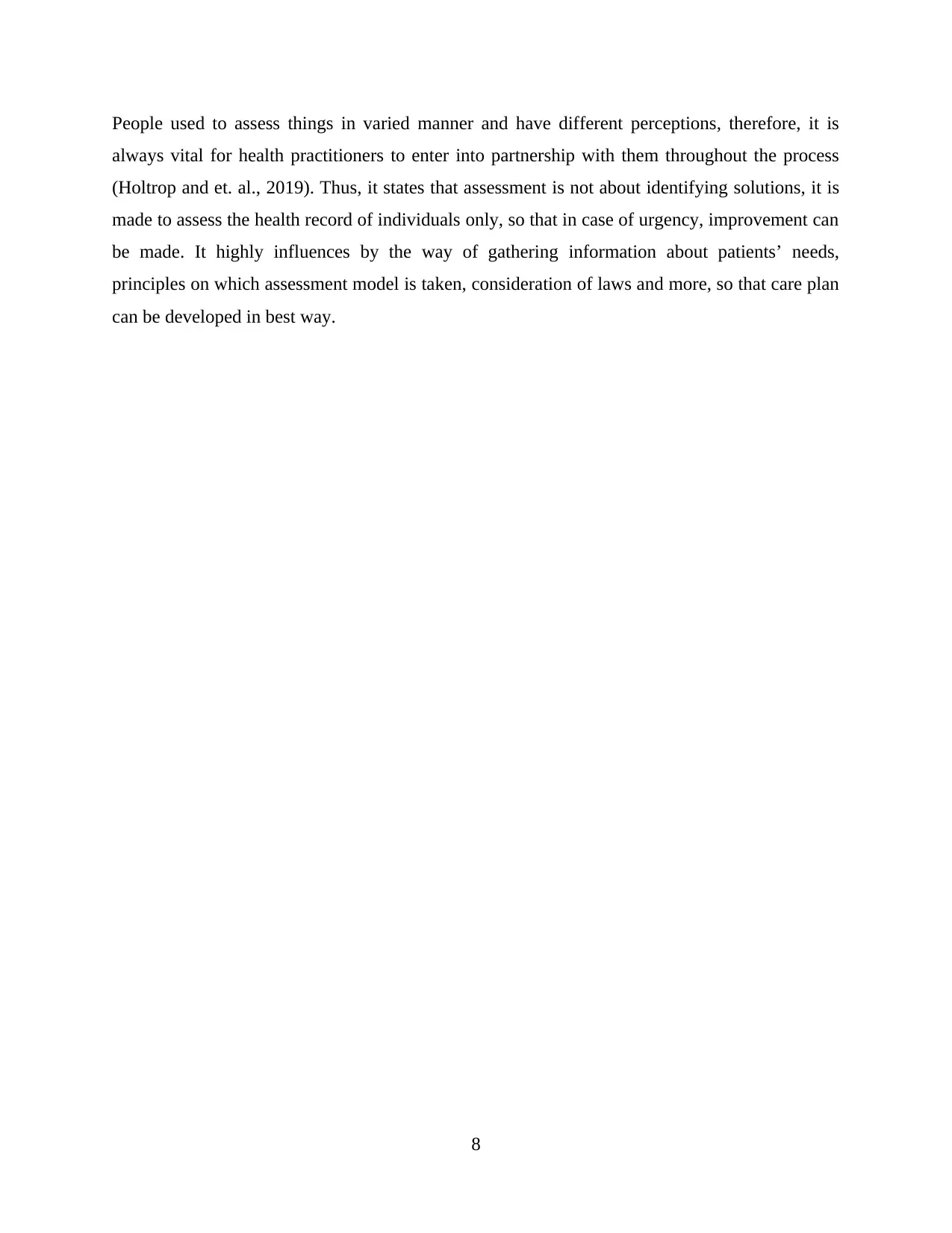
People used to assess things in varied manner and have different perceptions, therefore, it is
always vital for health practitioners to enter into partnership with them throughout the process
(Holtrop and et. al., 2019). Thus, it states that assessment is not about identifying solutions, it is
made to assess the health record of individuals only, so that in case of urgency, improvement can
be made. It highly influences by the way of gathering information about patients’ needs,
principles on which assessment model is taken, consideration of laws and more, so that care plan
can be developed in best way.
8
always vital for health practitioners to enter into partnership with them throughout the process
(Holtrop and et. al., 2019). Thus, it states that assessment is not about identifying solutions, it is
made to assess the health record of individuals only, so that in case of urgency, improvement can
be made. It highly influences by the way of gathering information about patients’ needs,
principles on which assessment model is taken, consideration of laws and more, so that care plan
can be developed in best way.
8
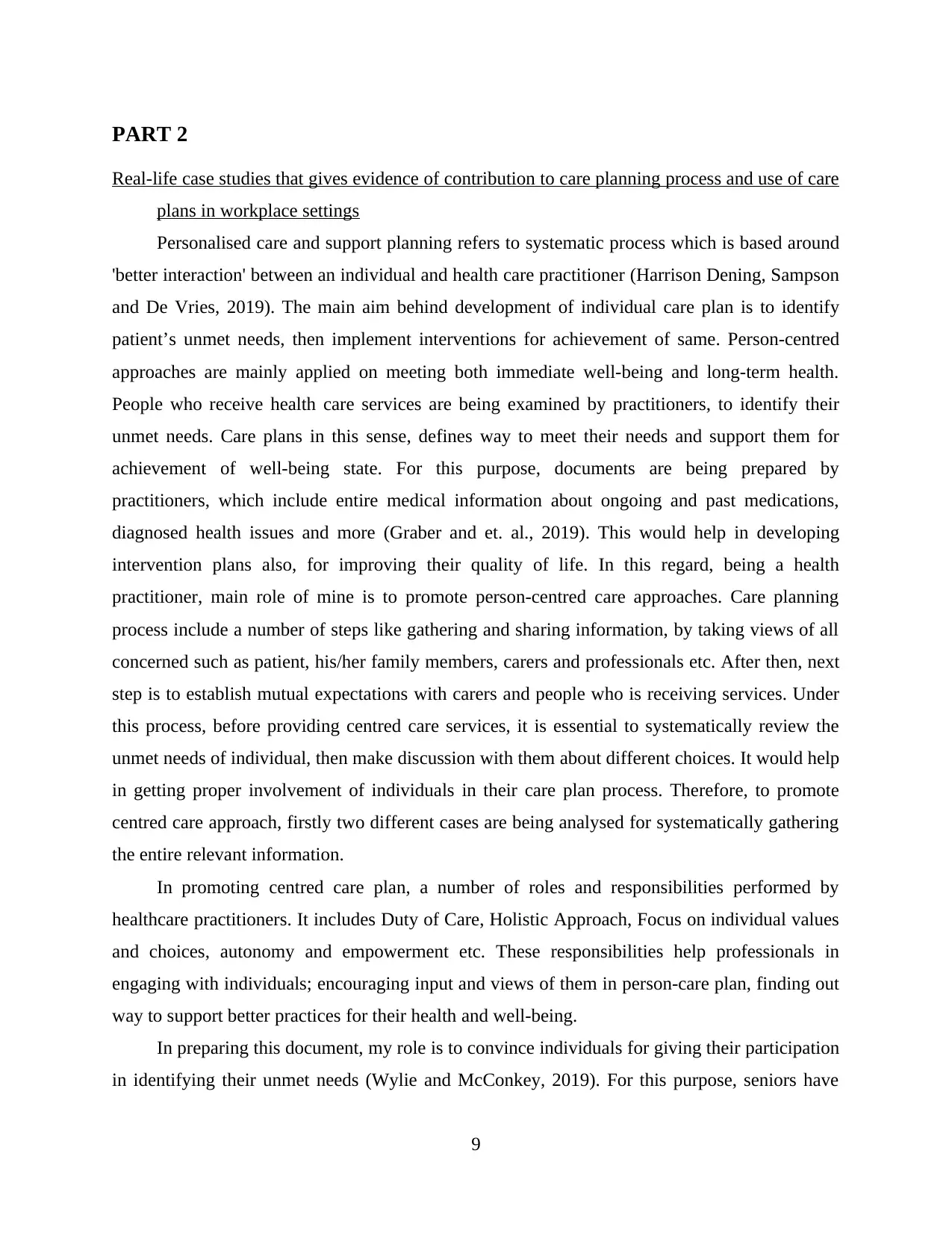
PART 2
Real-life case studies that gives evidence of contribution to care planning process and use of care
plans in workplace settings
Personalised care and support planning refers to systematic process which is based around
'better interaction' between an individual and health care practitioner (Harrison Dening, Sampson
and De Vries, 2019). The main aim behind development of individual care plan is to identify
patient’s unmet needs, then implement interventions for achievement of same. Person-centred
approaches are mainly applied on meeting both immediate well-being and long-term health.
People who receive health care services are being examined by practitioners, to identify their
unmet needs. Care plans in this sense, defines way to meet their needs and support them for
achievement of well-being state. For this purpose, documents are being prepared by
practitioners, which include entire medical information about ongoing and past medications,
diagnosed health issues and more (Graber and et. al., 2019). This would help in developing
intervention plans also, for improving their quality of life. In this regard, being a health
practitioner, main role of mine is to promote person-centred care approaches. Care planning
process include a number of steps like gathering and sharing information, by taking views of all
concerned such as patient, his/her family members, carers and professionals etc. After then, next
step is to establish mutual expectations with carers and people who is receiving services. Under
this process, before providing centred care services, it is essential to systematically review the
unmet needs of individual, then make discussion with them about different choices. It would help
in getting proper involvement of individuals in their care plan process. Therefore, to promote
centred care approach, firstly two different cases are being analysed for systematically gathering
the entire relevant information.
In promoting centred care plan, a number of roles and responsibilities performed by
healthcare practitioners. It includes Duty of Care, Holistic Approach, Focus on individual values
and choices, autonomy and empowerment etc. These responsibilities help professionals in
engaging with individuals; encouraging input and views of them in person-care plan, finding out
way to support better practices for their health and well-being.
In preparing this document, my role is to convince individuals for giving their participation
in identifying their unmet needs (Wylie and McConkey, 2019). For this purpose, seniors have
9
Real-life case studies that gives evidence of contribution to care planning process and use of care
plans in workplace settings
Personalised care and support planning refers to systematic process which is based around
'better interaction' between an individual and health care practitioner (Harrison Dening, Sampson
and De Vries, 2019). The main aim behind development of individual care plan is to identify
patient’s unmet needs, then implement interventions for achievement of same. Person-centred
approaches are mainly applied on meeting both immediate well-being and long-term health.
People who receive health care services are being examined by practitioners, to identify their
unmet needs. Care plans in this sense, defines way to meet their needs and support them for
achievement of well-being state. For this purpose, documents are being prepared by
practitioners, which include entire medical information about ongoing and past medications,
diagnosed health issues and more (Graber and et. al., 2019). This would help in developing
intervention plans also, for improving their quality of life. In this regard, being a health
practitioner, main role of mine is to promote person-centred care approaches. Care planning
process include a number of steps like gathering and sharing information, by taking views of all
concerned such as patient, his/her family members, carers and professionals etc. After then, next
step is to establish mutual expectations with carers and people who is receiving services. Under
this process, before providing centred care services, it is essential to systematically review the
unmet needs of individual, then make discussion with them about different choices. It would help
in getting proper involvement of individuals in their care plan process. Therefore, to promote
centred care approach, firstly two different cases are being analysed for systematically gathering
the entire relevant information.
In promoting centred care plan, a number of roles and responsibilities performed by
healthcare practitioners. It includes Duty of Care, Holistic Approach, Focus on individual values
and choices, autonomy and empowerment etc. These responsibilities help professionals in
engaging with individuals; encouraging input and views of them in person-care plan, finding out
way to support better practices for their health and well-being.
In preparing this document, my role is to convince individuals for giving their participation
in identifying their unmet needs (Wylie and McConkey, 2019). For this purpose, seniors have
9
⊘ This is a preview!⊘
Do you want full access?
Subscribe today to unlock all pages.

Trusted by 1+ million students worldwide
1 out of 22
Related Documents
Your All-in-One AI-Powered Toolkit for Academic Success.
+13062052269
info@desklib.com
Available 24*7 on WhatsApp / Email
![[object Object]](/_next/static/media/star-bottom.7253800d.svg)
Unlock your academic potential
Copyright © 2020–2026 A2Z Services. All Rights Reserved. Developed and managed by ZUCOL.




